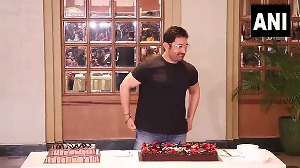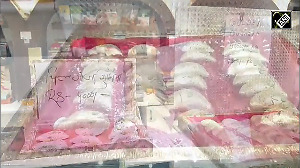The Indian government's propsed amendments to the IT Act have stirred a hornet's nest. Vicky Nanjappa speaks to experts on cyber law, who explain the flaws in the proposed legislation.
The draft rules drawn up by the government of India aimed at policing blogs has not gone down too well with a large section of people. The draft rules, drawn up by the government under the Information Technology Amendment Act, 2008, deal with due diligence to be observed by an intermediary.
Under the draft rules, an 'intermediary' is defined as any entity which on behalf of another receives, stores or transmits any electronic record. This would effectively mean that telecom networks, web-hosting and internet service providers, search engines, online payment and auction sites and cyber cafes would fall under the definition of an intermediary.
While this is one part of the story, the rules also propose to include the bloggers under the same category.
Pavan Duggal, an expert on IT laws and an advocate in the Supreme Court, explains that the proposed rules are secondary legislation which is being sought to be implemented by the Union government.
"The proposed rules are worded in largely generic terms which will require a subjective interpretation. This means that an intermediary would be subject to the discretionary interpretation of the said rules by the law enforcement agencies and hence will have no clarity of how to ensure full compliance with the law. There are huge problems since the inherent nature and scope of businesses of various businesses that fall under the same definition, get the same medicine. We are giving the same medicine to all kinds of fruits which are different in nature.
"There lies a fundamentally flawed recognition of the reality of the internet today. There is no way a blogger can be equated to a telecom company. Neither can a cyber café be equated to a search engine. Nor can an online market place be equated to an ISP. If one reads these rules then it only achieves at doing this."
Duggal says that with these broad diverse components of stake holders which come under the term intermediary, the prudent approach would be to come out with sectoral guidelines which keep in mind the customised lines of business of various sectors.
It will be asking for much to expect a normal blogger to conduct an ISO 27001 certification. Further these rules are likely to act as impediments to the further growth of electronic eco-system in India. The need of the hour is to come across a legislation or a secondary legislation that is not only benevolent but enables and facilitates inclusive growth.
The draft rules further go on to speak about protecting minors. The parameters are too huge for minors. It talks about harming minors. If a nonsensical false page of a child is created it would be considered as harmful from all perspectives.
In that stretch, most of the websites, blogs and other online platforms will be in breach of these guidelines from the moment they are implemented. The moment these rules come in to force, they will have a very damning impact on the growth of blogging since it exposes them to high levels of compliance. This will have a negative impact in the long run.
If these rules come into being, a bloger or a tweeter would have to work as a diligent, extremely-observant policeman. To some extent it would have an impact on freedom of speech. Bloggers cannot write anything which is a violation of the IT act. It is possible that a criticism of the government could be perceived to be coming within the prohibited category depending on the peculiar nature of each case. The potential for abuse of these rules in their current form is highly probable. To a large extent, the rules possibly overreach the main legislation.
The draft rules suffer from a major flaw of the one size fits all approach. It is basically valuating intermediaries based on their compliance or non compliance of draft rules. There needs to be a more pro-active approach to recognise the inherent differences of various categories.
Pranesh Prakash, programme manager at the Centre for Internet and Society, says that the draft rules relate to intermediaries, cyber cafes and security practices.
"The laws on intermediaries and the law on cybercafés have been issued under Section 79 (Liability of Intermediaries) of the IT Act. The one on reasonable security practices has been issued under Section 43A.
"These rules do not affect bloggers alone. They affect everyone online and not just Indians.
"The IT act applies to both Indians and persons abroad. Everyone who has been classified as an intermediary including people who blog or use social networking sites could come under this law.
"Each one of them will have to display a notice and every intermediary from websites to other sites are covered under the law.
"Everyone who is classified as an intermediary is affected by the rules because intermediaries are required not to host or publish content that violates Rule 3(2).of the IT Act. This would mean that all internet users are also affected. One wouldn't apply the same rules and regulations on the kind of diligence required to be observed by a newspaper as on the postal department, as related to the content they deliver.
"Similarly, one shouldn't apply the same rules to a blogging service provider as one would with with an e-mail provider.
"Since the application of the IT Act and these rules isn't limited to India, these rules might well mean that a popular website like amazon.com would have to carry a notice that nothing that "threatens the unity, integrity, defence, security or sovereignty of India" can be sold via their website, and must enforce that notice. How would we like it if American law were to be made applicable to Indian companies?
"Sub rule 3 of the act says we can't host anything that contravenes sub rule 2. The rule is made under the act. If someone contacts you then you have to remove the content. How on earth are we supposed to know if something violates the law. It is the judges who have to decide this. How can one find out whether the content is defamatory or not?
"These rules contradictory to the freedom of speech as mandated in the Constitution of India. The amendments need to be debated properly before they can come into force. If it is introduced in their existing form they would be disastrous," Prakash said.








 © 2025
© 2025